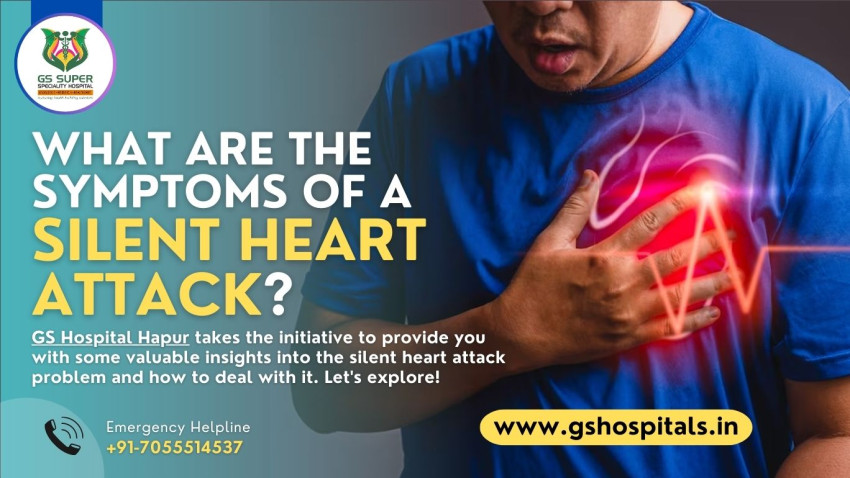
Majority of us are aware of silent heart attacks. Yes, we have heard this very commonly among famous Indian celebs from Comedian fame Raju Srivastava to Big Boss fame Siddharth Shukla. In recent times, silent heart attacks have been quite common among the younger generation. In such cases, awareness of these attacks is very important. GS Hospital Hapur takes the initiative to provide you with some valuable insights into the silent heart attack problem and how to deal with it. Let's explore!
What is a silent heart attack?
As the name suggests - “silent heart attack” means no signs and signals for a heart attack to occur. This generally has a sudden onset without any prior warnings which can occur at any time of the day or night while being awake or in sleep.
Wondering about no signs of a heart attack? This can be quite dangerous. However, you can keep these sudden issues at bay by knowing the causative factors of the silent heart attack. Let's explore the causes of silent heart attacks in the next part of the article.
Causes of silent heart attack
We all know the major cause of heart attack is blockage of coronary arteries mainly due to atherosclerosis or myocardial infarction. There are higher chances of a heart attack in patients prone to diabetes, hypertension, and high cholesterol issues. However, contrary to this, a silent heart attack may occur in perfectly healthy individuals as well at times. This may be due to the following reasons:
- Stressful event
- Emotional event on hearing bad news
- Being overactive physically like lifting heavy weights
Patients who suffer from silent heart attacks generally have no history of prior hypertension, diabetes, or cholesterol issues.
What happens during a silent heart attack?
During a silent heart attack, there is a sudden disruption of oxygen and blood flow to the heart. This causes damage to the heart muscles. There may be a high risk of heart failure at times if ignored. In medical terms, a silent heart attack may cause an infarct of a certain part of the cardiovascular system causing a sudden cut off to your blood and oxygen supply.
Symptoms of a silent heart attack
The symptoms of a silent heart attack are as follows-
● Strange sensation in the heart
● Discomfort and uneasiness
● May mimic acidity or indigestion
● Sudden aching of jaws, arms, chest, or upper back
● Soreness of chest or back muscles
● Feeling tired, weakness, malaise, or fatigue
● Uncomfortable feeling
● Sharp chest pain lasting for a few seconds to minutes
● Shortness of breath
● Sweating mainly cold sweat
● Lightheadedness
● Nausea and vomiting may occur
These above-mentioned symptoms may not even make you realize that you will have a silent heart attack.
Risk factors of silent heart attack
The high-risk factors of silent heart attack are as follows-
● Obese or overweight
● Sedentary lifestyle
● Lack of exercise
● Unhealthy diet with high salt, fat, or sugar intake
● High-stress levels
● Addictions like smoking or tobacco
● Preeclampsia during pregnancy
● Higher incidence in postmenopausal women
If you are resonating with any of the above-mentioned high-incidence categories for cardiac issues, there are certain precautions that you can take. Let us know how to prevent silent heart attacks to lead a healthy lifestyle.
Treatment for silent heart attack
At times, cardiac issues can be unpreventable. Let's face the fact, especially in cases of a silent heart attack. No matter what precautions you take, it might just occur unknowingly. In such cases, it is important to reach out for medical help at the earliest to prevent further damage to the heart.
Most of the patients won't even realize that they may have suffered from a silent heart attack due to a lack of obvious signs. Here are the treatment protocols which will be followed by top heart care hospitals.
● Rush you to the emergency department
● Give you aspirin or break the clot if any
● Provide oxygen supply
● Common medications prescribed by cardiologists may include beta-blockers, anticoagulants, statins, and ACE inhibitors.
● Surgical interventions like bypass, coronary artery bypass graft with stent
Hold on! Do not self-medicate yourself or anyone associated with a silent heart attack. It is important to reach out for professional medical expertise in cardiac care with the best heart hospital. If you are unable to do so, get connected with the best heart hospital in Uttar Pradesh for top cardiologists with expertise and high-quality care.




